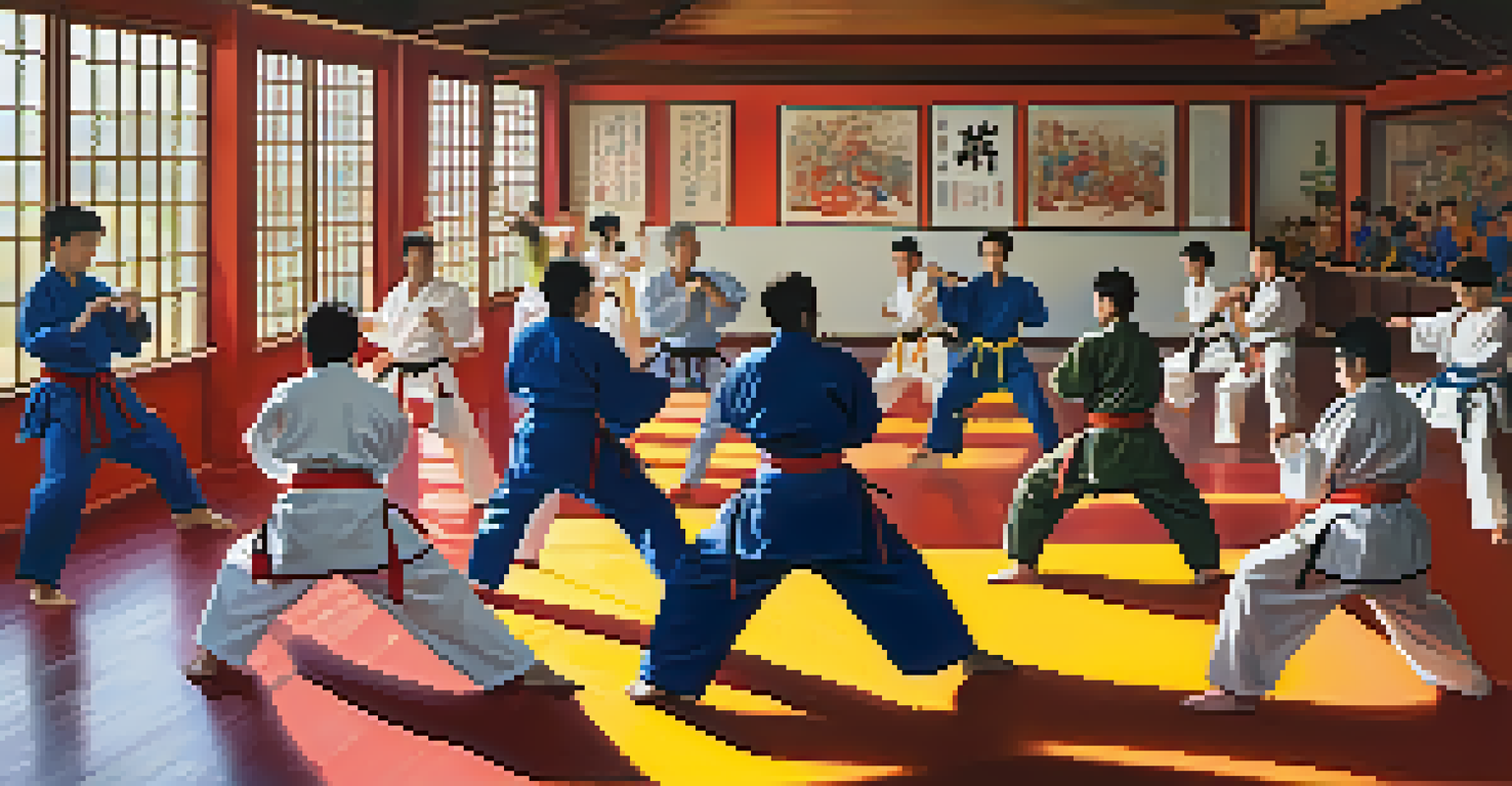Physical Fitness in Martial Arts as a Stress Management Tool

Understanding Stress and Its Impact on the Body
Stress is a natural response to challenges, but when it becomes chronic, it can wreak havoc on our physical and mental health. Symptoms like fatigue, anxiety, and irritability can arise, affecting our overall well-being. Understanding how stress affects us is the first step in finding effective management strategies.
The greatest weapon against stress is our ability to choose one thought over another.
When the body experiences stress, it enters a 'fight or flight' mode, releasing hormones like cortisol and adrenaline. While this reaction is useful in short bursts, prolonged exposure can lead to serious issues such as high blood pressure and weakened immune response. Thus, finding a healthy outlet for stress is essential.
Martial arts, with its emphasis on physical fitness and discipline, provides an excellent avenue for stress relief. By engaging in these practices, individuals can counteract the negative effects of stress and embrace a healthier lifestyle.
The Physical Benefits of Martial Arts Training
One of the most significant advantages of martial arts is its impact on physical fitness. Training typically includes cardiovascular workouts, strength building, and flexibility exercises, all of which contribute to improved health. As you become fitter, your body becomes more resilient to stress.

Moreover, regular physical activity boosts endorphin levels—often referred to as 'feel-good' hormones. These natural chemicals can alleviate feelings of anxiety and depression, creating a sense of well-being. In this way, martial arts serve as a dual-purpose tool: building strength while simultaneously lifting your spirits.
Stress Management Through Martial Arts
Martial arts provide effective strategies for managing stress by enhancing physical fitness and mental discipline.
Incorporating martial arts into your routine not only enhances physical health but also cultivates a sense of accomplishment. Each technique mastered and belt earned reinforces confidence, which can be incredibly beneficial for those struggling with stress.
Mental Discipline: A Key Component of Martial Arts
Martial arts aren’t just about physical prowess; they also emphasize mental discipline. Practices like meditation and focused breathing techniques are integral to training, helping practitioners develop a calm, centered mindset. This mental clarity can be invaluable when it comes to managing stress.
Martial arts is not about hitting; it’s about learning to control your body and your mind.
By learning to control your breath and thoughts during intense training sessions, you can apply these techniques to everyday life. This skill allows you to approach stressful situations with a more balanced perspective, reducing the likelihood of feeling overwhelmed.
Furthermore, the focus required in martial arts helps clear the mind of distractions, allowing practitioners to be present in the moment. This practice of mindfulness is a powerful antidote to stress, promoting emotional resilience.
Building a Supportive Community Through Martial Arts
Joining a martial arts class often means becoming part of a supportive community. Training alongside others fosters camaraderie and can create strong friendships, which are crucial for emotional support. This sense of belonging can significantly reduce feelings of isolation often associated with stress.
Having a community to share challenges and victories with can be incredibly uplifting. Whether it's celebrating a new belt rank or simply sharing a laugh after a tough sparring session, these connections can help lighten the emotional load. Positive social interactions are known to enhance mental health.
Community Support Enhances Well-Being
Joining a martial arts class fosters a supportive community that reduces feelings of isolation and promotes emotional health.
Moreover, learning from instructors and peers can provide additional motivation to push through tough times. Knowing that others are cheering you on can make all the difference in managing stress effectively.
Setting Goals and Achieving Success in Martial Arts
Martial arts training is built on the concept of setting and achieving goals, which can be incredibly empowering. Whether it's mastering a new technique or preparing for a competition, these objectives provide a sense of direction and purpose. This focus can help shift attention away from stressors in daily life.
As practitioners work toward their goals, they experience a series of achievements that boost self-esteem and confidence. Each small victory reinforces the ability to overcome challenges, both on and off the mat. This newfound confidence can spill over into other areas of life, helping individuals tackle stress more effectively.
Additionally, the discipline required in martial arts encourages a proactive approach to life. Instead of feeling like a victim of stress, individuals can become active participants in their own well-being, taking steps to improve their mental health.
Breathing Techniques: A Natural Stress Reliever
Breathing is a fundamental aspect of martial arts practice, and mastering specific techniques can serve as a powerful stress management tool. Controlled breathing helps regulate the body's stress response, promoting relaxation and mental clarity. It’s a simple yet effective practice that anyone can incorporate into their daily life.
In times of stress, taking a moment to focus on your breath can ground you and bring you back to the present. Techniques such as deep diaphragmatic breathing can help calm the nervous system and reduce feelings of anxiety. This practice can be especially useful during stressful moments at work or home.
Goal Setting Boosts Confidence
Setting and achieving goals in martial arts empowers individuals, increasing self-esteem and enabling better stress management.
Furthermore, integrating breathing exercises into your martial arts routine offers a holistic approach to stress management. It reinforces the mind-body connection, allowing you to harness physical fitness as a way to foster emotional balance.
Conclusion: Martial Arts as a Lifelong Stress Management Tool
In conclusion, martial arts offer a multifaceted approach to stress management that encompasses physical fitness, mental discipline, and community support. By engaging in these practices, individuals can improve their physical well-being while simultaneously fostering emotional resilience. This powerful combination makes martial arts a unique tool for navigating the ups and downs of life.
As you embark on your martial arts journey, remember that the benefits extend far beyond the dojo. The skills learned can be applied to everyday situations, empowering you to manage stress effectively and cultivate a healthier mindset.

Ultimately, martial arts can be a lifelong companion in the pursuit of balance and well-being. Whether you’re a seasoned practitioner or just starting, the path of martial arts can lead you toward a more fulfilling and less stressful life.